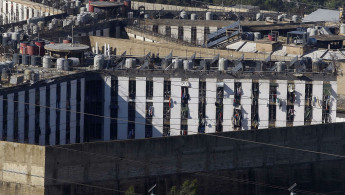Lebanon raid: a tough new crackdown against extremists?
A Lebanese raid on prison Sunni extremist inmates linked to a recent suicide bombing in Tripoli was swift and to the point. However, analysts say they do not believe it signals a "zero tolerance" campaign by the government.
On Monday, Lebanon's Internal Security Forces raided the overcrowded Roumieh prison east of Beirut after it was discovered that inmates had been in contact with a suicide bomber who killed nine people in Tripoli on Saturday.
| When the groups become too confident ... the government moves in on them. - Sami Atallah |
However, analysts do not believe the raid marks a change in Lebanon's policy towards extremists, which is a complicated balancing act rather than one of zero tolerance.
"It's by no means an indicator that the government is prepared to change how things are policed in the future," Dave Hartwell, the editor of the Middle East Insider, told al-Araby al-Jadeed.
'Accommodating' extremist Sunni groups
The existence of extremist Sunni groups in Lebanon is a relatively new and limited phenomenon, but has grown as the crises in Syria and Iraq snowballed. Sunni militants are now present in the country, especially in Tripoli and northern areas.
However, Lebanese security has had a relatively "hands off approach" to such groups, according to Hartwell, partly because of fear that a tough approach would drive more young people into their arms.
Sami Atallah, of the Lebanese Centre for Policy Studies, said he believed that there was also a more complicated and "grey" relationship between established political parties and extremist Sunni groups.
"These groups are allowed to roam around, which is partly a policy to defuse tension," he told al-Araby.
The established Sunni political parties cannot crack down too strongly on the groups because they do not want to be seen to be doing the bidding of Hizballah, Lebanon's militarised Shia party.
There is a delicate sectarian and political balance to maintain in Lebanon, as well as an attempt to remain officially neutral with regard to the Syrian conflict.
Intelligence services certainly keep a close eye on these groups, but Atallah said he believed there was "a sort of accommodation with them". They are allowed to exist in the country as long as they do not challenge the established Sunni parties.
"When the groups become too confident or begin to explore violent means, then the government moves in on them," he said.
Prison Block B
The government has certainly moved in on them since Saturday's suicide bomb. The ISF's Special Panthers unit stormed Block B, which houses about 190 inmates associated with the Fatah al-Islam group.
Prisoners were transferred to another block, sparking protests that saw inmates setting fire to their mattresses. Helicopters hovered as the raid took place, and local television footage saw smoke rising from the building.
Saturday's suicide bombing took place in a cafe in the Alawite neighbourhood of Tripoli, Jabal Mohsen, which has seen several violent clashes and bombings since the Syrian conflict broke out in 2011, particularly on the border between Sunni and Alawite neighbourhoods.
It was claimed by the Nusra Front, an affiliate of al-Qaeda, and the bombers came from Mankoubeen, the impoverished Sunni area next to Jabal Mohsen.



